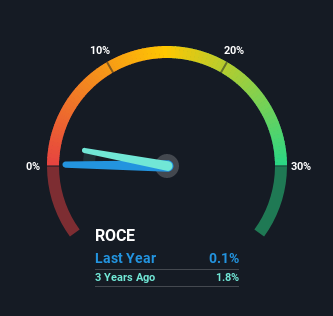The Returns On Capital At Molson Coors Canada (TSE:TPX.B) Don't Inspire Confidence
When researching a stock for investment, what can tell us that the company is in decline? Typically, we'll see the trend of both return on capital employed (ROCE) declining and this usually coincides with a decreasing amount of capital employed. This combination can tell you that not only is the company investing less, it's earning less on what it does invest. So after we looked into Molson Coors Canada (TSE:TPX.B), the trends above didn't look too great.
Understanding Return On Capital Employed (ROCE)
Just to clarify if you're unsure, ROCE is a metric for evaluating how much pre-tax income (in percentage terms) a company earns on the capital invested in its business. Analysts use this formula to calculate it for Molson Coors Canada:
Return on Capital Employed = Earnings Before Interest and Tax (EBIT) ÷ (Total Assets - Current Liabilities)
0.0013 = US$12m ÷ (US$10b - US$1.4b) (Based on the trailing twelve months to September 2020).
So, Molson Coors Canada has an ROCE of 0.1%. In absolute terms, that's a low return and it also under-performs the Beverage industry average of 13%.
Check out our latest analysis for Molson Coors Canada

While the past is not representative of the future, it can be helpful to know how a company has performed historically, which is why we have this chart above. If you're interested in investigating Molson Coors Canada's past further, check out this free graph of past earnings, revenue and cash flow.
So How Is Molson Coors Canada's ROCE Trending?
We are a bit worried about the trend of returns on capital at Molson Coors Canada. To be more specific, the ROCE was 1.3% five years ago, but since then it has dropped noticeably. Meanwhile, capital employed in the business has stayed roughly the flat over the period. Companies that exhibit these attributes tend to not be shrinking, but they can be mature and facing pressure on their margins from competition. If these trends continue, we wouldn't expect Molson Coors Canada to turn into a multi-bagger.
In Conclusion...
All in all, the lower returns from the same amount of capital employed aren't exactly signs of a compounding machine. Investors haven't taken kindly to these developments, since the stock has declined 53% from where it was five years ago. Unless there is a shift to a more positive trajectory in these metrics, we would look elsewhere.
Since virtually every company faces some risks, it's worth knowing what they are, and we've spotted 3 warning signs for Molson Coors Canada (of which 2 are a bit concerning!) that you should know about.
If you want to search for solid companies with great earnings, check out this free list of companies with good balance sheets and impressive returns on equity.
New: Manage All Your Stock Portfolios in One Place
We've created the ultimate portfolio companion for stock investors, and it's free.
• Connect an unlimited number of Portfolios and see your total in one currency
• Be alerted to new Warning Signs or Risks via email or mobile
• Track the Fair Value of your stocks
This article by Simply Wall St is general in nature. We provide commentary based on historical data and analyst forecasts only using an unbiased methodology and our articles are not intended to be financial advice. It does not constitute a recommendation to buy or sell any stock, and does not take account of your objectives, or your financial situation. We aim to bring you long-term focused analysis driven by fundamental data. Note that our analysis may not factor in the latest price-sensitive company announcements or qualitative material. Simply Wall St has no position in any stocks mentioned.
Have feedback on this article? Concerned about the content? Get in touch with us directly. Alternatively, email editorial-team (at) simplywallst.com.
About TSX:TPX.B
Molson Coors Canada
Molson Coors Canada Inc. brews, markets, sells, and distributes various beer brands in the Americas, Europe, the Middle East, Africa, and the Asia-Pacific.
Unattractive dividend payer with very low risk.
Similar Companies
Market Insights
Community Narratives




